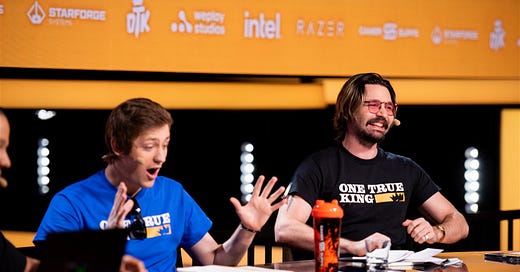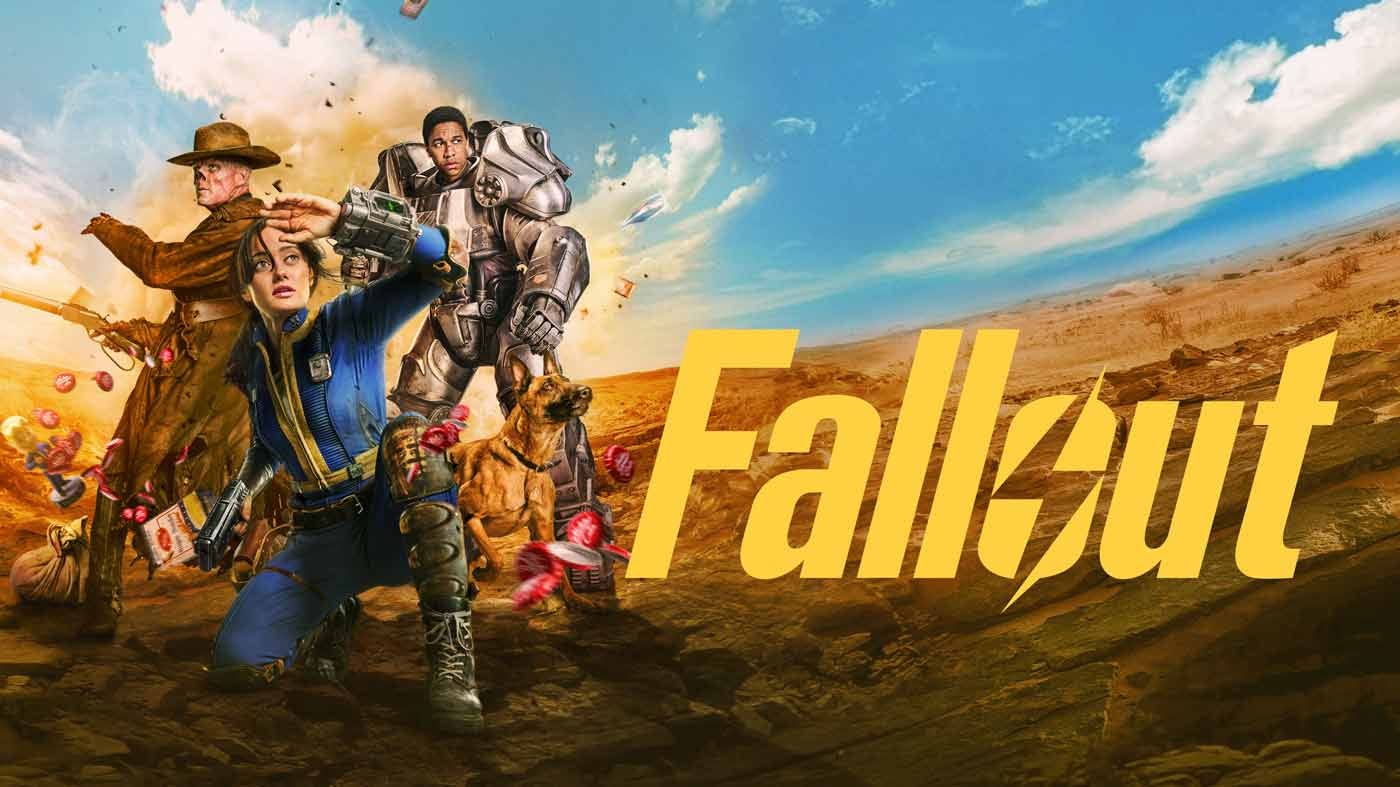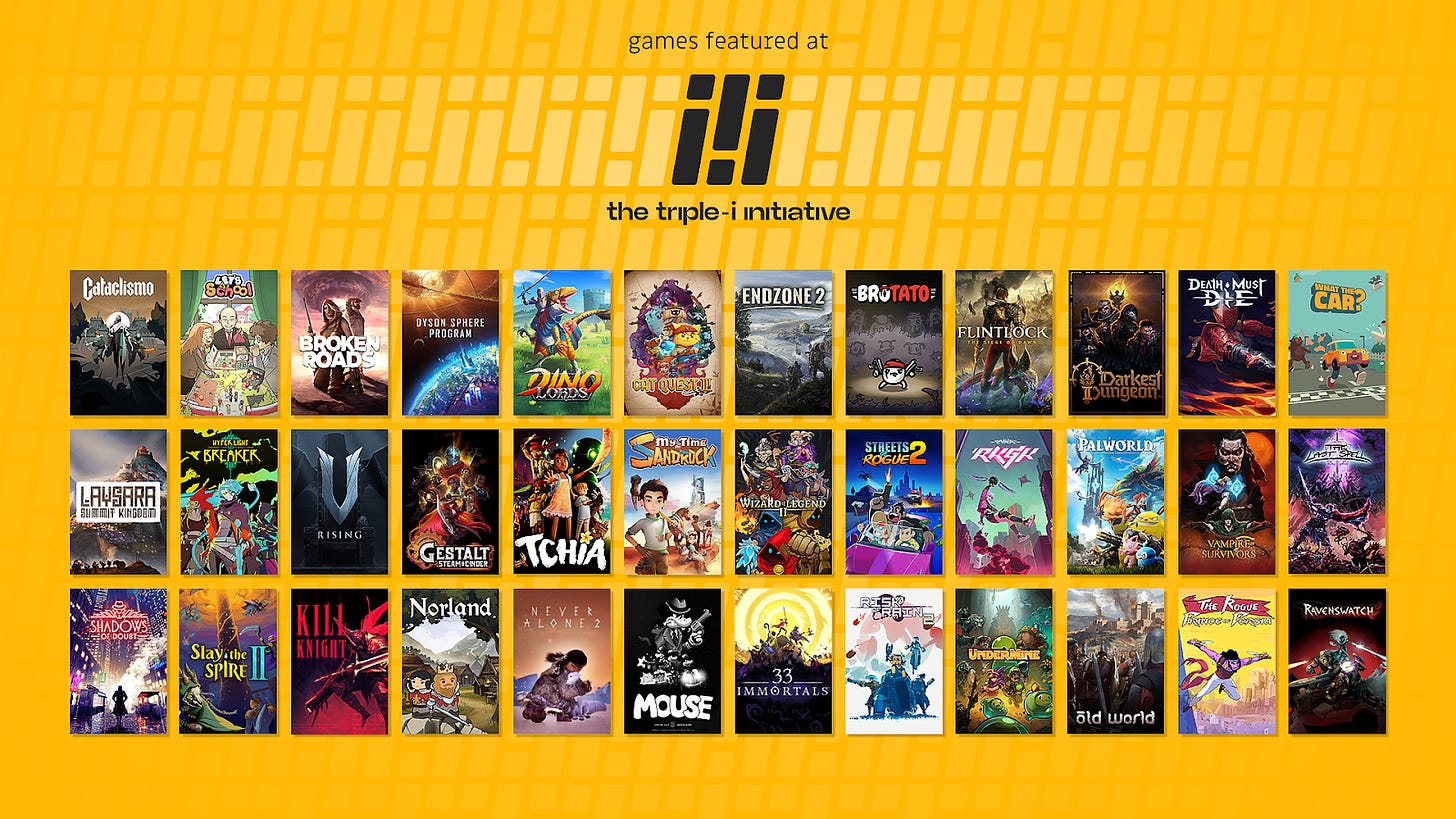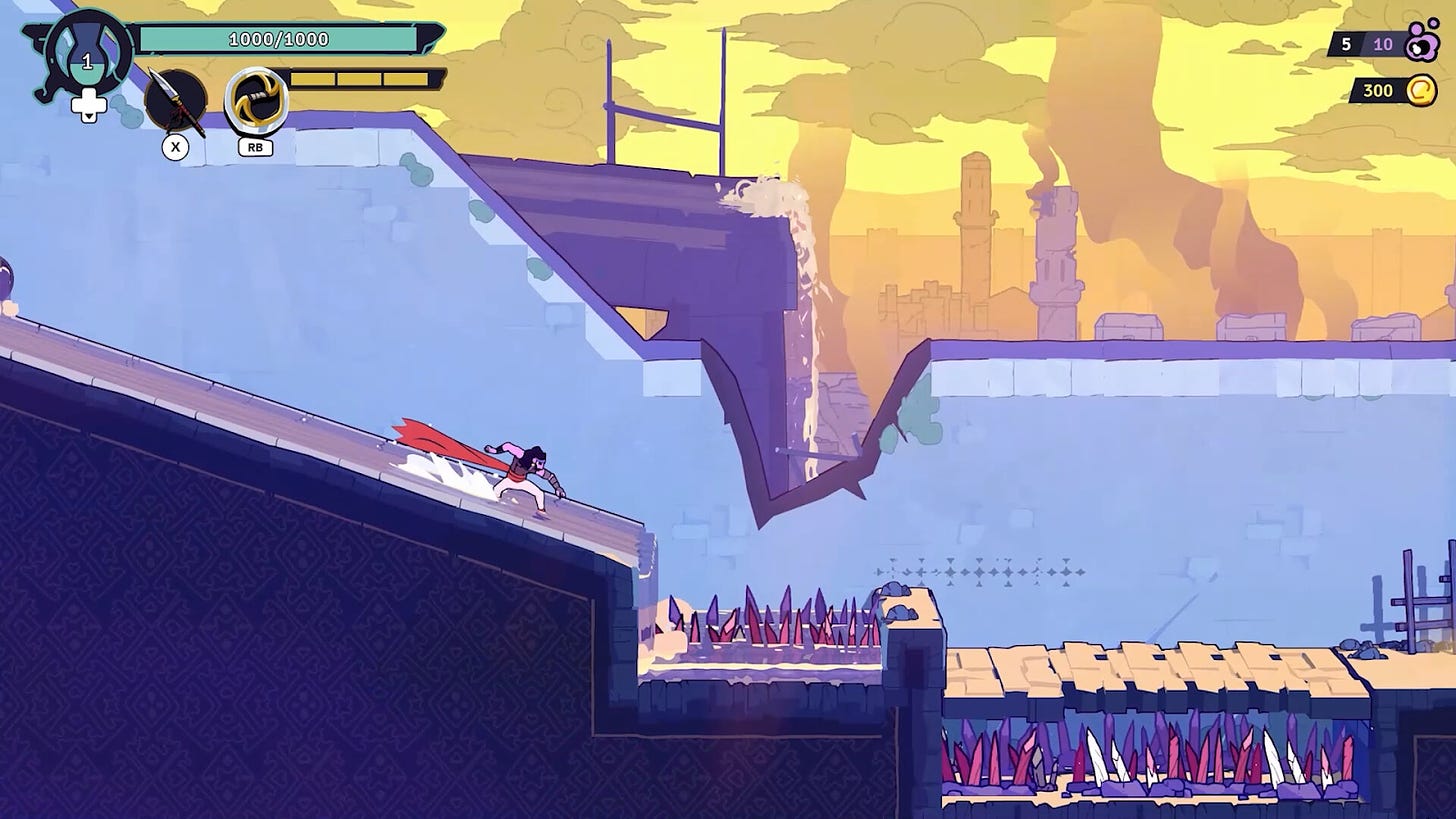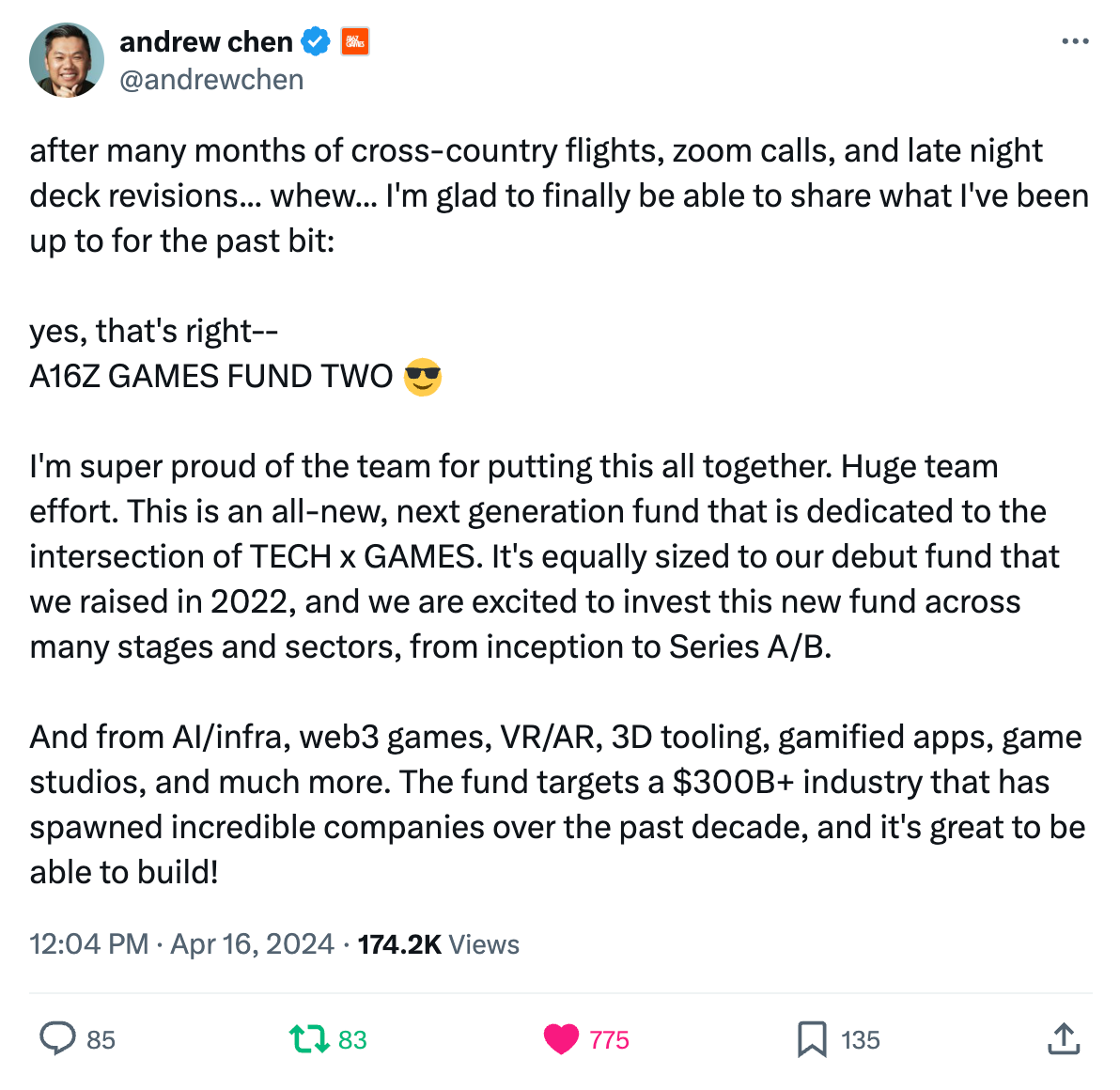Your Attention Please: A New Era of Games Showcases is Here
Meet the organizers of the Triple-i Initiative, Wholesome Games, and the OTK Expo
In this wild, new post-E3 era, every game developer has to find a way to get their games discovered.
This week we spoke to founders taking things into their own hands by creating a new wave of targeted digital showcases aimed at reaching players directly.
Find that story below. But first, your regular games industry news roundup.
News From the Future
⚡ Fallout Games Surge in Popularity Thanks to Hit TV Show (PCGamesN)
Thanks to the critically-acclaimed Fallout TV show on Prime Video, over 160,000 concurrent players piled into Fallout 4 on Steam this weekend, with another 100,000 split between Fallout 76 and New Vegas. Combined with the news that the show has been renewed for season two, it’s safe to say Todd Howard is having a good week.
👻 Cliffy B’s Long-Dead FPS LawBreakers is Playable Again (IGN)
Cliff Bleszinski’s 2017 shooter LawBreakers hasn’t had official server support since 2018, but fans of the game have stepped in to create functional matchmaking services themselves. Cliffy B himself has promoted the fans’ efforts on X, amid other cryptic posts suggesting a larger-scale comeback for the game.
🪓 Embracer Will Split into Three Publicly-Listed Companies (Embracer)
The new companies will be Asmodee Group (focused on tabletop gaming), Coffee Stain & Friends (for indie and F2P titles), and a third branch focused on AAA. For some reason they’re calling the last of these “Middle-earth Enterprises & Friends,” which is probably what Bilbo Baggins would call his family office. All three firms will be listed on Nasdaq Stockholm when the transformation is completed.
📱 The Rise of the Everything Game (NAAVIK)
Although they first emerged as “party royale” Fall Guys alternatives, games like Stumble Guys and NetEase’s Eggy Party are now evolving into something entirely new: “Everything Games” with playable experiences inspired by Among Us, PUBG, and Vampire Survivors, all within one app.
👀 Applications for SPEEDRUN 003 are closing soooooon 👀
If you're looking to secure $750K in funding for your startup, now’s your chance!
The deadline to apply is May 19th, 2024. Applying now, rather than waiting until the deadline, gives us more time to review your application and engage with you personally, avoiding the last-minute rush.
APPLY NOW: sr.a16z.com
If you have any questions, please don't hesitate to reach out to our dedicated team at sr-apps@a16z.com.
Your Attention Please: A New Era of Games Showcases is Here
French developers Evil Empire know a thing or two about promoting games.
The 70-person studio—best known for handling expansion packs and live service for the indie roguelite sensation Dead Cells—have regularly scored coveted promo slots in digital showcases like The Game Awards and Nintendo Direct.
But for their upcoming game, the slick side-scroller The Rogue Prince of Persia, Evil Empire realized they had a scheduled problem. Their plans didn’t line up with any of the available shows out there.
That, says Evil Empire COO and Triple-i Initiative Event Director Benjamin Laulan, is when his team began to entertain a seemingly wild idea: “What if we did our own thing?”
Seven months later, Laulan (together with event co-creator Bérenger Dupre) finally revealed The Rogue at the conclusion of a 45-minute presentation featuring over 30 other games, including surprising game announcements like Slay the Spire II and teases for updates for established indie hits like Palworld, Risk of Rain 2, and V Rising.
This was their new “premium indie” focused showcase, the cheekily-named Triple-i Initiative.
Beyond the hundreds of thousands of players that the Triple-i Initiative reached through its own channels, Evil Empire reached millions more through influencer-led react content, media coverage, and—perhaps most crucially for the devs that were featured—a partnership with Valve that culminated in a major front-page takeover of Steam promoting Triple-i’s showcased titles.
Laulan describes a process of going “dev by dev, brick by brick” to gather interest in participating in the showcase. Some—like Spiritfarer creators Thunder Lotus Games—were on board from the jump. But others took time.
The lead announcement at the event, Mega Crit’s Slay the Spire II, was “a very late add,” Evil Empire CEO Steve Filby said, but the Evil Empire team was able to connect Mega Crit with French animation studio Wizz to produce their beautiful animated trailer in time for the showcase.
“Every piece of the puzzle kind of clicked together almost in the same week,” says Laulan.
But click together it did. By the end of the week, some developers who participated in the Triple-i Initiative showcase were announcing impressive results. UnderMine 2 devs Thorium said they’d gotten over 30,000 Steam wishlists in the first 24 hours since their reveal. Evil Empire says they’ve “seen similar performances with other games.”
Instead of doing their “own thing” as originally planned the small French developers ultimately created a moment that lifted up dozens of their peers.
In so doing, they were also demonstrating a new way of solving one of the biggest problems facing game developers today: getting noticed.
Marketing On Target: The Attention Problem
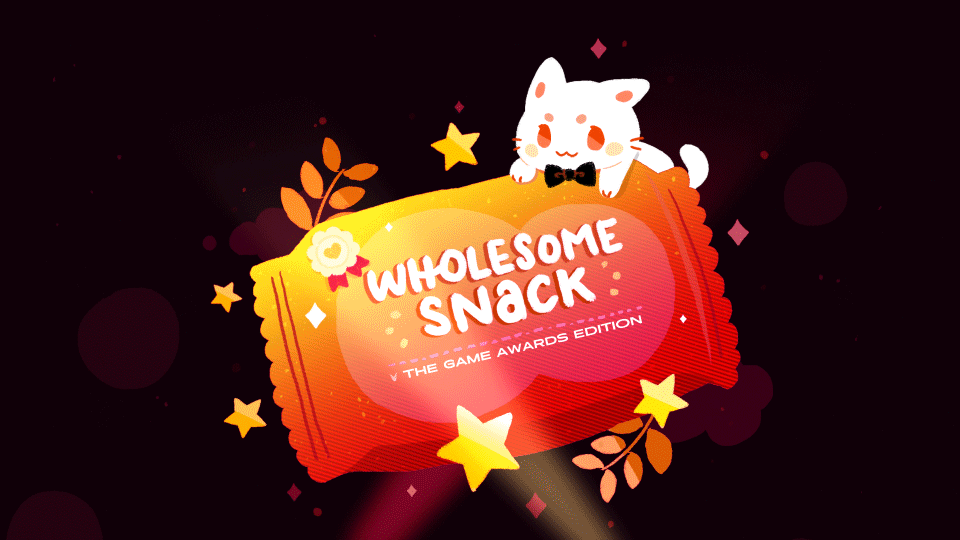
In our post-E3 era, says Benjamin Laulan, one of the best things to happen for game developers is the emergence of digital showcases like The Game Awards and Nintendo Direct.
But the very scale of these events comes with their own drawbacks.
The Game Awards and Nintendo Directs are “amazing in terms of views and visibility for your game,” Laulan says, “but as big as they are, they’re not necessarily talking to your audience to the kind of player that would buy your game and enjoy it. You're talking to fans of big AAA games or Zelda fans.”
In other words, the people watching these showcases are there because they’re waiting for the new Hideo Kojima game. Or—bless their hearts—they’re hoping for Waluigi in Smash.
Plus, Laulan adds, getting into these showcases can be a challenge. "To enter The Game Awards, you have to have something that stands out. With seven billion games coming out every second, it's obviously complicated to grab that attention.”
Given the scale of these challenges, then, it’s no wonder that smaller, more targeted showcases have begun to emerge.
Matthew Taylor is the founder of Wholesome Games, which has filled a niche highlighting games that might not otherwise be taken seriously by publishers or fans.
Some of these games, says Taylor, “had been pushed out of the gaming space because they were stereotyped as kids' games or girls' games and never given the same attention as gloomier, more critically acclaimed titles.”
Taylor points to games like Minami Lane, which recently launched to over 1,400 “overwhelmingly positive” reviews on Steam, as a game that “has an art style, perspective, and game loop that perfectly straddles the line between familiar and unique.”
“It's an almost-impossible balancing act,” Taylor says, “but the games that excite me the most are the ones that are delightfully fresh without being totally alienating. The games that slip between the cracks are often so unique that players don't understand their appeal, or so defined by an existing genre that they can't separate themselves from the pack.”
Taylor believes that this is a challenge facing all creative fields, not just games. “It takes more than ever to stand out,” he says. “I've curated and shared many games that I personally thought were amazing, but didn't find an audience because they needed a few minutes to convey what made them special, as opposed to a few seconds.”
Tips Out, the CEO of the OTK Network and its games showcase the OTK Expo, says he thinks that games discovery is quickly becoming the single toughest challenge facing game developers—even harder than financing or execution.
“Game saturation is an ever-increasing problem,” says Tips. “Every developer and publisher, regardless of size, is feeling the squeeze right now, and actionable eyeballs have never been more difficult to come by.”
Tips points to systemic challenges like the rising cost of user acquisition and unpredictable returns on ad spend as root causes of the difficulties facing devs, but says that devs have to start getting more strategic about their games’ positioning and go-to-market strategies as well.
“It's baffling to me how many games get made with no clear target demographic or cohort, he says. “Games are similar to other products; your product has to serve value to a target audience while standing above the sea of mediocrity.”
Are Showcases Enough?
Assuming that you’ve made a great game, and made smart bets about your target audience, how then should a game developer go about promoting and marketing that game? And is getting into the right showcase enough?
Evil Empire CEO Steve Filby doesn’t think so. Despite heralding the success of the Triple-i Initiative and the reveal of The Rogue Prince of Persia, he says that the showcase was not “a real end-all solution.”
“It was a massive win for us,” Filby says. “Probably the best start that you could have for the launch of a marketing campaign for a game. But we're still up against the problem of "Okay, what else can we do?”
Part of the heavy lifting, Filby says, will come as part of the Steam Early Access launch for The Rogue, which is coming May 14th this year.
“Early Access is an integral part of our strategy,” he says. “I don’t see myself building games today without that community and that support, or without spending that time on community building.” From there, The Rogue will have chances to reach more players with its eventual 1.0 launch and its expansion to other platforms.
Filby says he thinks of each of these beats as “arrows in the quiver.”
“We're shooting a bunch of different arrows to make sure that we get out of that dead zone,” Filby says. “We don't want to be one of those games that comes out and just doesn't get the audience that it—hopefully—deserves.”
OTK’s Tips Out agrees, saying that while there are no guarantees in the games marketing business, there are ways beyond showcases to increase your chances of winning. He advises devs to make game trailers that showcase what makes their game stand out within the first 10 seconds, for example.
But some tried-and-true marketing techniques do continue to work, as well. “If you can afford it, license a strong IP,” Tips says. “If you can’t, copy a strong IP,” or create a game that creates “shock and awe” with its artwork.
“If you don’t want to do that,” Tips says, there’s always one solid option: “waifus.”
“At the end of the day, showcases are sort of like DJs,” says Matthew Taylor of Wholesome Games.
“They'll only be successful if you as a viewer can resonate with the taste of whoever is curating the event. No amount of machine learning, tags, or charts beats the curation of a human who genuinely loves their area of expertise.”
Applications for this year’s Wholesome Games Direct and OTK Expo are now open.
A16Z GAMES thanks these amazing people for their contributions to this article:
Benjamin Laulan, Evil Empire COO
Matthew Taylor, Founder of Wholesome Games
Steve Filby, Evil Empire CEO
Tips Out, CEO of the OTK Network
From the A16Z GAMES Team:
Last week Andrew Chen announced $600 million raised for A16Z GAMES FUND TWO:
💼 Jobs Jobs Jobs
There are currently around 150 open jobs listings across both the A16Z GAMES portfolio and our SPEEDRUN portfolio. For the freshest games industry jobs postings, be sure to follow our own Caitlin Cooke and Jordan Mazer on LinkedIn.
Join our talent network for more opportunities. If we see a fit for you, we'll intro you to relevant founders in the portfolio.

